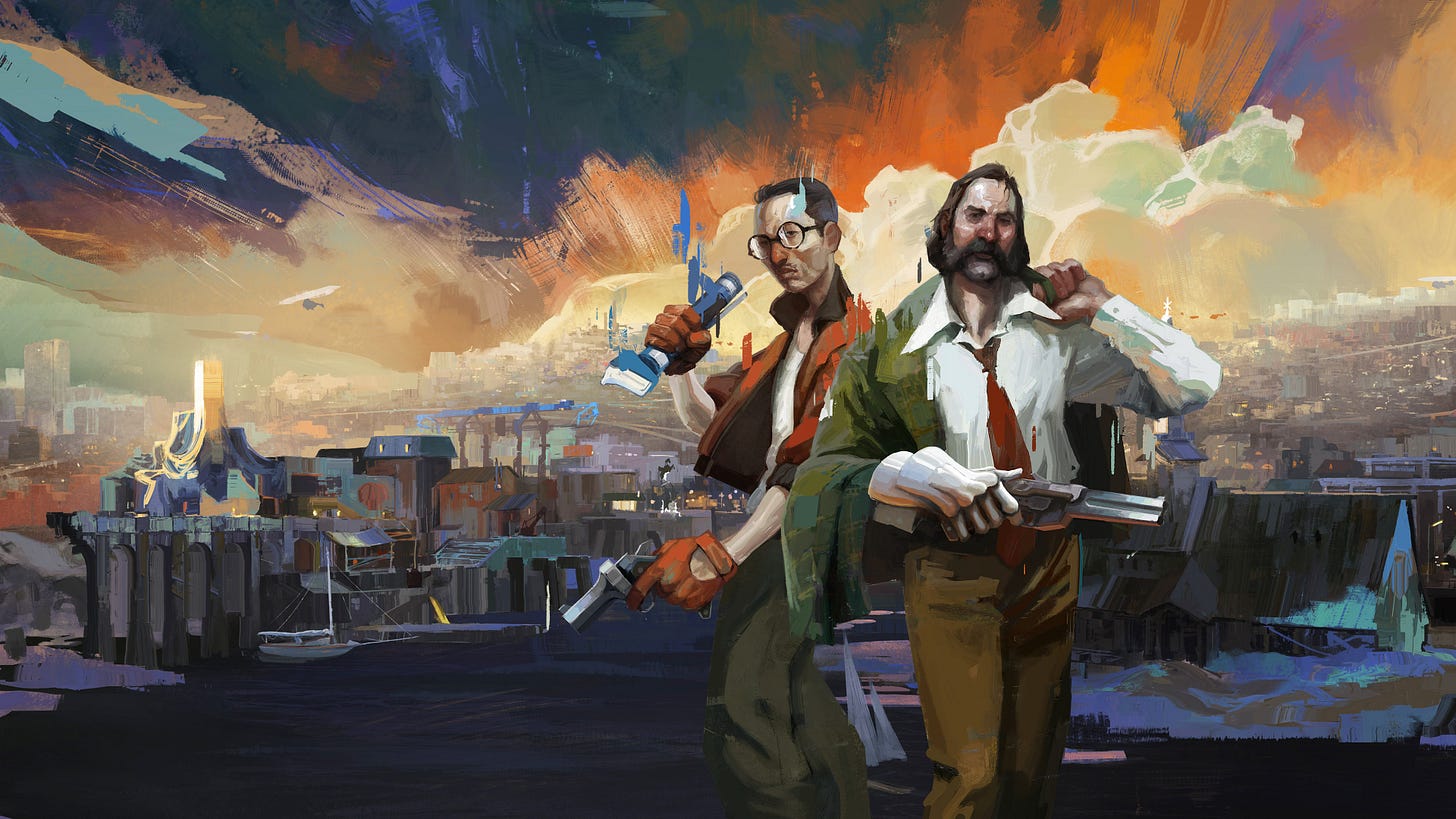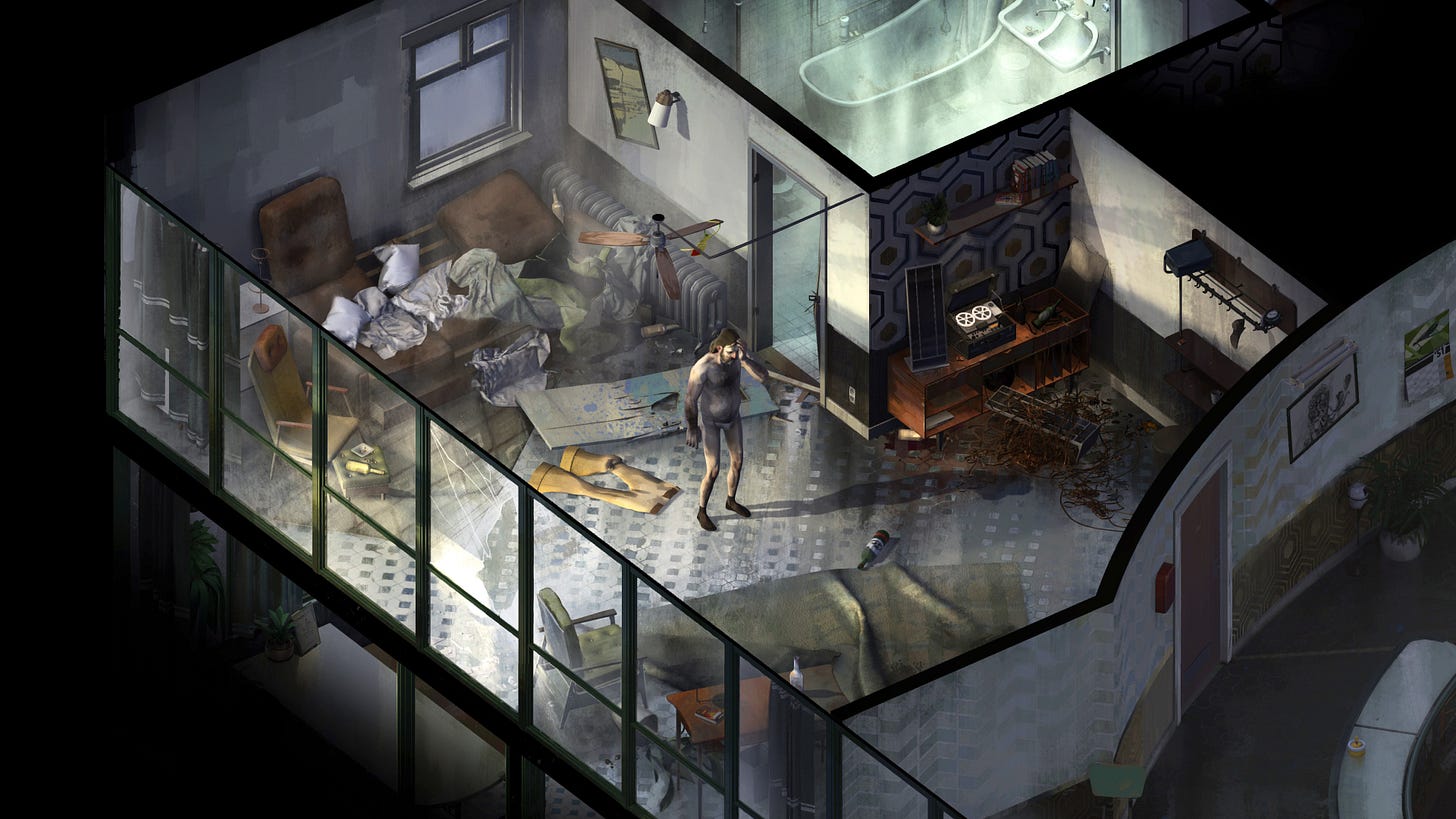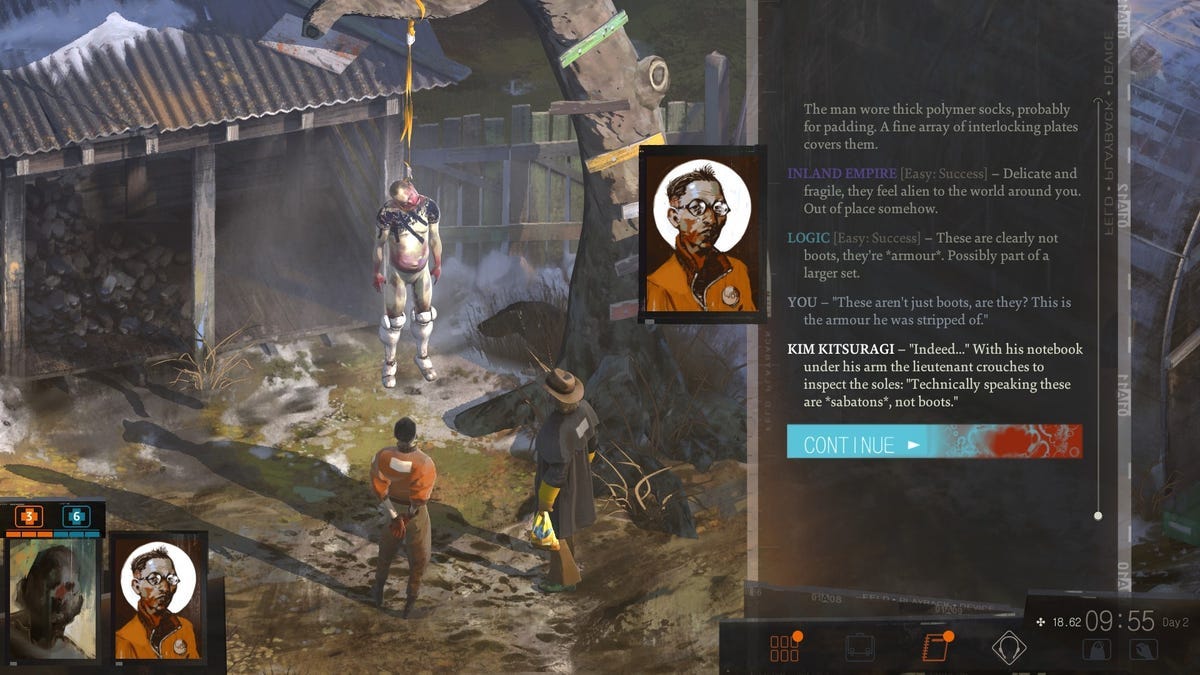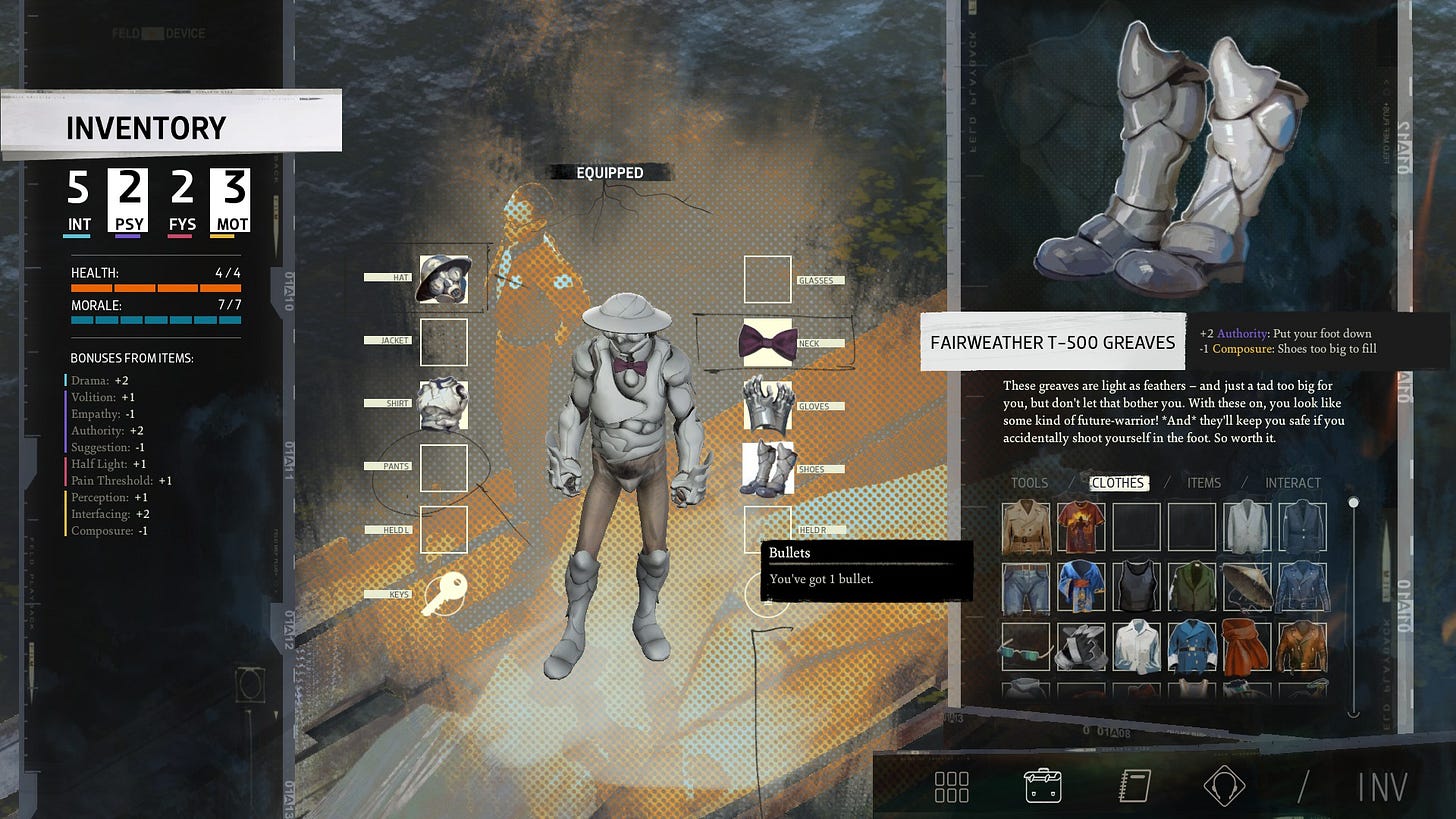While amassing notes on cRPG design for a henceforth unmentionable project, I sat down this week to replay 2019’s Disco Elysium for the first time since its release. Everyone was talking about it back then, especially everyone I knew, and the opinion was universal: this was the best-written and most mature game ever released. Its script made BioWare’s attempt at adult roleplaying games look infantile. Only Fortnite players, high school dropouts, and “traditionalists” could possibly dislike it.
Contesting that premise was and remains folly. Disco Elysium is a supernova of wit; a Roman triumph of originality; a bull through the bleachers of creativity. The setting is gripping enough to strangulate. The characters are vivid and lifelike in every gutter and ditch and stretch of reeds. The political subject matter is handled reasonably well, and the script manages to be incessantly funny while brawling with serious topics.
But my thoughts were nevertheless mixed as I meandered my way through the streets of Martinaise as an ultra-liberal on that first playthrough, collecting tare and preaching the free market as a homosexual hobo-cop. With my thought closet full and the map explored, I found the thinning of the plot increasingly tiring. The midgame of Disco Elysium is blighted by huge stretches of voluminous worldbuilding that are mostly irrelevant to the mystery Harry and Kim have been sent to solve. You walk around, ask people questions about the order of creation, and then do it again. While fascinating in some academic sense, I can’t stand exposition of that kind in games. This is the same criticism I have of Planescape: Torment.
I want motion in my RPGs. I want to find the killer and progress my relationships with the NPCs. I want plot.
The story almost lost me. I got bored. Too much reading. Too slow. Where were things going? Did I even care? Yes, the writing was good; it was hilarious, it was compelling, but it felt too disorganized. Everything was too dense. I wasn’t interested enough in the setting to justify the time the writers wanted me to invest in learning about it. The grinding brakes of apathy screeched my enjoyment to a halt. I started skipping a lot of conversations.
I forced myself to the ending anyway. I stumbled into the fifth day, drunken and directionless.
Then my opinion completely changed.
The magnificent third act of Disco Elysium deserves to be studied alongside the Insulindian Phasmid within a large and virescent nature reserve. Detective Kuuno de Ruyter and I solved the case, unraveled a centuries-old mystery, apprehended a recalcitrant communard, and recovered HDB’s lost memories within what is undoubtedly the most satisfying three-hour stretch of any game I’ve ever played. So much of what I had done—and so much of it optional—came together to create a bespoke climax that I was never going to forget.
I forgave all of my criticisms of pacing and became a preacher of Disco.
In the half-decade since I have continued to identify Disco Elysium as one of the best RPGs ever made, perhaps objectively the best. That is how good I felt the ending to be. But I’ve never counted it among my favorites. Until now I’ve never felt any desire to revisit it. I haven’t been curious about alternate paths. I haven’t been tempted to see what was added in The Final Cut.
But last night, I finished it again. This time I wanted to get every achievement, so I played a centrist-“traditionalist”-communist (at the end of the game Kim chastised me for being both a fascist and a communist, which he claimed made no sense; apparently he doesn’t know about achievements) with a spectacular physique but no intellectual or psychic capacity whatsoever. This was the inverse of my first HDB, who was frail and corporeally disintegrating, yet possessed vast mental faculties.
I had forgotten a surprising amount of the story. Though I still knew the true killer’s identity, the esplanade toward finding him had mostly left my memory. It was almost like unraveling the mystery for the first time all over again.
At fist I found that I was much more forgiving of endless exposition and crushing verbosity than I was during my original playthrough. Armed with the knowledge that the story was going to go somewhere, I put up with much more than I normally would have. I had an excellent time.
But it didn’t last. After ten hours my mood toward DE mirrored my first experience with the game almost exactly. I found the beginning to be transcendent, intoxicating, entrancing; but the middle was tedious. As fun as it can be to hear the stridulations of Harry’s 9mm fingerguns while doing Mr. Claire’s chores, or to quiz the White Pines representative on What Is Reality, or to learn about the complex revolutionary history of Revachol, this section of the game is mostly a structureless morass of huge walls of text, with only occasional glimpses of meaningful character or story interactions between. It becomes extremely tedious, especially if played for more than an hour or so a day.
Disco Elysium is overwritten. I’m sure there are some players who take great delight in sifting through endless question-asking about a fake world that is never going to get another game, and that’s fine, but I’m not one of them. I would much rather learn about Revachol through the natural course of the story, such as you do at the end of the game. Quizzing NPCs about history and geography is not compelling by comparison.
But the ending is still magnificent, and despite having a few rough (and, it must be said, largely optional) stretches, the game is gravid with memorable moments. Disco Elysium is not afraid to let the player have fun. Sing karaoke. Find ridiculous clothes. Say insane things. Do drugs. Meet interesting people. Set things on fire. Most games wouldn’t let you wear the murdered mercenary’s combat armor, because that’s farcical. But this game is different. That is half of its magic, and that holds up.
So I can report that time has not changed my opinion on the story overall. It’s still brilliant, and it’s still too slow (in a few places). But that’s fine. It’s easy enough to know when something will or won’t be relevant, and the spacebar key is extremely effective at skipping through walls of text when you’re getting bored.
But what about its design?
Disco Elysium has no combat. Its mechanics are skill checks and map exploration. Earn XP by completing quests and talking to NPCs. Most dice rolls, which are determined by 2d6 rolls plus modifiers, can be retried by adding another point into the skill in question: there are six per each of the four stats, for a total of twenty-four (though several are mostly or exclusively passive).
I was deep into my tabletop RPG phase in 2019, and I recall being frustrated that simple RNG was the best Disco Elysium’s designers had come up with for conflict resolution. Removing combat served the game well, but nothing took its place; there is no player skill required, not even really reading comprehension, to beat this game. If you exhaust every dialogue tree in order from top to bottom, you will solve the case. That is all it takes.
I thought something more abstract could have been designed to represent social “combat,” or to add skill back in to the equation. Real gameplay could have made a huge difference and turned those dull middle stretches into more than what they are.
I’m not as convinced that it matters anymore. The skill checks are fine for what Disco Elysium is—an exercise in incredible writing. But its greater RPG mechanics leave much to be desired. The white check retry system has bizarre incentives; you should never invest your points into anything until you’ve failed a test. Then you should try it once, exit out, invest a point, try it again, etc. The game is screeching at you to do this, and the huge number of skills necessitates it. In this sense there are no builds in Disco Elysium, but only permanent upgrade-scars left on Harry by his retry tokens.
This is a very strange system. It does everything in its power to encourage savescumming. If you’ve invested three points into Pain Endurance just for this one check, and the odds of success in totality were something like 98.7%, you will probably not accept failure if it comes. The investment of resources was simply too high for that.
I dislike Disco Elysium’s attitude toward failure more generally. When you fail a roll, the game punishes you with damage to your health pools—while also preventing you from getting what you want. The game has no concept of “failing forward.” Surely health should be a resource spent to achieve desired outcomes and mitigate RNG, not simply a way to be punched while down? Either damage me and give me what I came for, or keep it from me and do nothing else. But don’t punish me for trying.
DE always punishes you for trying. A better system of resource management could have eliminated white checks, sped the game up, and eliminated the incentive to reload saves so often. That “failure” equals “you do not get what you want, period” is a D&Dism that had no reason to be carried over into a system like Disco Elysium, which really has more in common with a Powered by the Apocalypse game in its dice engine. Failure should be its own punishment, especially when it can come despite doing everything right.
There are many people online who will argue that the game is “just as fun” if you always accept failure and never reload. They’ll claim it doesn’t matter if your progress is blocked. Things are better sometimes when you don’t get what you want.
This might be true for some games. There are places where it probably is even true in Disco Elysium. But for the most part, I don’t see it. Leaving aside the numerous places where you will instantly be killed for choosing the wrong option or failing the wrong test, there are countless checks that are virtually mandatory for anything resembling a positive outcome, where failure will result in less game, that is less interesting. If you think missing an entire plot-vital reed-related encounter at the game’s climax due to RNG is “just as interesting” as the alternative, I’m not sure what to say to you. It just isn’t. That you can roll snake eyes despite having 99% odds to succeed (like I did last night) is like shit in the wound. Why wouldn’t you reload that? There has to be a better solution than leaving it all up to RNG. Baldur’s Gate 3’s inspiration system is one good way to help mitigate problems like this.
The closest thing to a challenge component that Disco Elysium has is dressing up HDB in the correct wardrobe for the task at hand and making sure his stats are arrayed correctly before engaging in a conversation. Your spec barely matters, because so many bonuses are available through clothes and context and drugs that skills are irrelevant.
There is joy in changing Harry’s hat, but it’s also tedious. By the end of the game, continuously sifting through 40+ articles of clothing whenever the odds are beneath 70% is exhausting.
This all could have been avoided with better design. A system could have been devised to invert the bonuses. Modifiers should have been applied after a roll, not before, so the player could always know whether it was worth spending time climbing through menus before he started doing it. XP could have been turned into a direct resource, because let’s face it: that’s already what it is. This would have eliminated so many of DE’s strange incentives and made for a much better mechanical experience.
But that’s something to ruminate on for future RPGs made in Disco Elysium’s mold. Ultimately, reloading a save only takes a moment. The systems do work adequately for what is effectively a very fancy choose-your-own-adventure game with expensive graphics. Dragon Age: Origins, New Vegas, and Pillars of Eternity 2 also fail colossally in systems design, so it’s not fair to linger overmuch on what are minor demerits to Disco Elysium’s immensely strong overall showing.
So the core systems aren’t stellar, but Martinaise is a fantastic environment. Traversing its streets is sometimes-frustrating, but atmosphere seeps from every gutter like the odor from a hanged man’s eyeballs. There is a strong tactile sense to the interactivity of the world. Picking up coins makes a satisfying clink. Tapping thought bubbles causes a gratifying scribble. You can jog from the eastern Dockyard to the western Lighthouse in two or three minutes, but everything between feels dense, like there’s always more to find if you learn something new. You will never get tired of this map.
Worlds like these, small, refined, and tightly interactable, are what more games should aim for. Density of content is superior to breadth, always. The environment is what makes exploring for clues and traveling between dialogues fun, and it’s why Disco Elysium is, definitively, still a game. The animators, artists, and level designers did an excellent job.
Despite my few reservations, the only people I would not recommend play Disco Elysium are the illiterate. But The Final Cut version now has full voice acting, so even they don’t have that much of an excuse. It’s a toweringly intelligent game, with excellent characters and more than its share of unforgettable moments. It excels precisely because its designers were not afraid to let their creativity go berserk and did not hesitate to include the strange, the surreal, the imaginative, or the challenging.
It’s honestly shocking that it was ever made. That a few guys working with Unity could throw a game like this together in their garage is believable, but Disco Elysium is not that. It’s a high-budget, well-polished AA cRPG. The quality of its writing is vastly superior to any other video game on the market, and in that regard it has held up perfectly over the last five years. Nothing made since has come close. I doubt anything ever will.
You owe it to yourself to give it a try. And if you find it occasionally overwritten, like I do, don’t be afraid to skim and skip the sidequests. No one will ever know.








